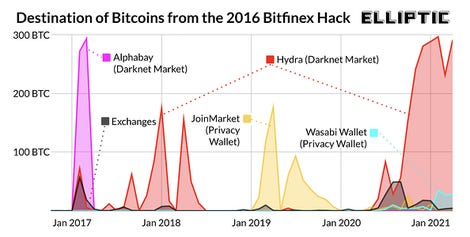The United States Department of Justice announced this week the seizure of more than $3.6 billion worth of cryptocurrency that was stolen in an attack on the Bitfinex cryptocurrency exchange in August 2016.
The DOJ also said it arrested Ilya Lichtenstein, 34, and his wife Heather Morgan, 31, for their role in attempting to launder 119,754 bitcoins stolen in the attack on the then-Hong Kong marketplace. . The prosecutor in charge of the case called this seizure “the largest financial seizure ever made by the Department of Justice”.
A total of around $4.5 billion was stolen and two brothers, Eli and Assaf Gigi, were arrested by Israeli authorities in 2019 for their involvement in the attack.
Complex whitening techniques
But last Tuesday, the Justice Department said Lichtenstein and Morgan – who were both very active on social media – initiated more than 2,000 unauthorized transactions as they tried to launder the 119,754 bitcoins stolen from Bitfinex. .
“These unauthorized transactions sent the stolen bitcoins to a digital wallet under Lichtenstein’s control. Over the past five years, approximately 25,000 of these stolen bitcoins have been transferred out of Lichtenstein’s wallet through a complicated process money laundering that ended with some of the stolen funds being deposited in accounts controlled by Lichtenstein and Morgan,” the DOJ explains.
“The remainder of the stolen funds, over 94,000 bitcoins, remained in the wallet used to receive and store the illegal proceeds of the hack. After the execution of court-authorized search warrants on online accounts controlled by Lichtenstein and Morgan, agents gained access to files in an online account controlled by Lichtenstein that contained the private keys needed to access the digital wallet that directly received funds stolen from Bitfinex, and enabled the seizure and legally recover over 94,000 bitcoins that were stolen from Bitfinex. The recovered bitcoins were valued at over $3.6 billion at the time of the seizure.”
US authorities then accused Lichtenstein and Morgan of using false identities to open online accounts and of using money laundering techniques. The stolen funds were also deposited on several crypto exchange marketplaces in an attempt to launder the sums with a process called “chain hopping”.
Bitcoins were converted into other currencies and bank accounts were used to make their transactions appear legitimate. “As part of a methodical and calculated plan, the defendants would have laundered and disguised their immense fortune,” said Jim Lee of the IRS-Criminal Investigation (IRS-CI).
Authorities added that they found 2,000 cryptocurrency wallet addresses and private keys in Lichtenstein’s cloud storage account, almost all of which were linked to the stolen funds.
The two were arrested in Manhattan, New York, last Tuesday, before appearing in court the same day to face charges of money laundering and fraud. If found guilty, they face a maximum sentence of 20 years on the first charge and five years in prison on the second.
“Ilya Lichtenstein and his wife Heather Morgan attempted to divert legitimate commerce for malicious purposes, operating in apparent anonymity,” said Steve Francis, associate director of Homeland Security Investigations (HSI).
In a statement, Bitfinex said it has been working with the DOJ since the investigation began and will work with law enforcement “to establish our rights to the return of stolen bitcoins.”
“If Bitfinex receives recovery of the stolen bitcoins, as described in this white paper, Bitfinex will, within 18 months of the date it receives such recovery, use an amount equal to 80% of the net funds recovered to repurchase and destroy the tokens. outstanding,” the company said. “These buybacks of tokens can be accomplished through open market transactions or by acquiring them through over-the-counter transactions.”

elliptical
Blockchain analytics firm Elliptic told ZDNet that approximately 21% of stolen bitcoins have been moved and laundered in the past five years.
Elliptic analysts found that various money laundering techniques were used – including sending the funds through darknet marketplaces like Alphabay and Hydra as well as the Wasabi Wallet private wallet, which was used to hide the money trail on the blockchain.
“Some of the funds were also sent to regulated exchanges that perform KYC checks on their customers, and it is likely that the suspects were identified by tracing the funds stolen from these services,” Elliptic said.
“The remainder of the stolen funds, currently worth $4.1 billion, were moved to a new wallet just last week, the first movement of these funds since the 2016 theft. This appears to represent the seizure of bitcoins from Lichtenstein and Morgan, by law enforcement.”
Bitfinix told its customers in 2016 that they would all share the loss, with each of them sharing a generalized loss percentage of 36.067%. The loss applied to everyone, even those who did not own bitcoins.
Source: “ZDNet.com”
